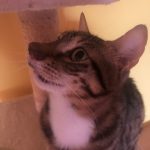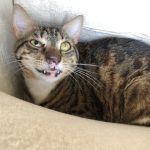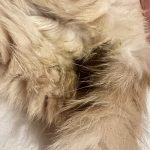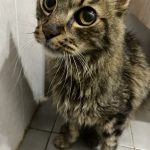Hello,
I avoid grain free. I don’t think there is likely any benefit to it while there is still a risk of heart issues. So I just don’t recommend it. Why worry about something that is avoidable?
Hello all,
I posted on here earlier this year asking for some advice about my cat who had a very advanced cryptococcosis infection.
Her right lymph node (submandibular) was swollen the entire time, and the left one but to a lesser degree.
She developed anisocoria and horners syndrome, droopy right eye, and she had a mass that felt like bone on top of her eye.
The anisocoria disappeared after 3 days and her pupils were entirely normal again.
Things escalated last week. Her nose has always been blocked, to various degrees, since she developed the symptoms, 1.5 years ago, but it seemed like she was able to get enough air in with some gasping and mouth breathing. I didn’t know how comfortable she was, but I had to try the last recommendation the vet suggested: 150mg of fluconazole a day. She was on this massive dose for 3 months. (4 kg cat)
Previously, she was on 37.5mg for 6 months, her nose and lesions cleared up and she was able to breathe again (most importantly!)
But, in March, a big lump (cryptococcosis mass) exploded into an abscess. It wouldn’t heal. The vet performed surgery to remove it and other lesions nearby. It was an eyesore, I felt so bad for her. She had a cone on for nearly 3 weeks because the suture area got a bit infected. Raised her fluconazole dose to 75mg a day.
Last week, her nose got much more inflamed and distorted very rapidly. It began bleeding and ulcerating, drying up and then bleeding repeatedly.
She looked so uncomfortable and basically slept all day in various positions to keep her head elevated. When near me or when sleeping with me at night, she’d clamp onto my arm or neck with her teeth to keep her mouth open so she could breathe and fall asleep. I can’t fathom how difficult it was to sleep having to make a conscious effort to get air in through her mouth. I understand cats are not “mouth breathers” and can’t fully relax that way.
I took her in to see her vet, 11 days ago, after noticing blood on her paw, and no wound. The vet looked inside her mouth and looked said the fungus was pushing through her soft palate (roof of mouth) into her front teeth. She recommended euthanasia and said she was not going to “get better” in her professional opinion. And that my cat was suffering and it wasn’t ok, I asked outright if her quality of life was ok. She said no. My cat had lost 1 kg since her last visit. This also factored into the vet’s recommendation.
The vet was ready to put my cat to sleep at the time of our consult, but I requested some time to digest and take her home to say goodbye.
Then, 4 days later, I took her in for euthanasia. I wish I had canceled. Am I wrong to feel that she should have died on her own terms?
What she had was like a breathing disability, in other ways she was a strong and vital cat. She was still eating, though appetite decrease by 30 or 40%.
Why did her nose not clear up (while the cutaneous lesions cleared) and in fact get worse after 3 months on a higher dose?
I’m so devastated and confused and wish I could have done more to save her life.
I felt selfish for letting her live this way, knowing there was no hope and I’d just be prolonging the inevitable (probably suffocation).
I am in so much pain recollecting what’s happened.
I wish I had kept her at home and only taken for euthanasia if she had collapsed and refused to eat. Taking her in to have her put down when she still asked to be fed, showed playfulness in some moments, trotting around when it was food time, it felt hasty but also inevitable. I felt I was saving her from experiencing more suffering as the fungus grew.
But, I will never know how it would have gone if I left her. Maybe nature would have performed a miracle, and she would heal, or she would die without my intervention and without pain (like a quick heart attack). I feel so terrible for having made the choice to snuff out her little life when she was still very strong.
She fought the sedative the vet gave, they took her back to insert a catheter and didn’t bring her to me until 40 mins later, saying she was fighting the sedative.
It pains my heart thinking she was in terror during her last hour on earth. When they carried her in, sedated, she looked absolutely petrified and braced. I could see her spirit fighting with all its might.
The vet told me that she had a more thorough examination of her nose and that the masses had hardened/were like concrete all through her nasal airway and that she was breathing through a “pin prick” hole. She said she was never more certain that euthanasia was the right choice.
I am so heartbroken. I still feel like I took her life away too early. Why should it be up to me? I can barely trust myself now.
Comments
Hello! I was listening to a lecture on animal nutrition, and it brought up the topic of grain-free diets. I used to feed my dogs the blue wilderness grain free diet. But is grain free safe for my dog? Should my dogs have grain in their diet? They are currently eating team dog and that has grains in it. Thank you!
Comments
Hi Krista
My almost 11 year old MC Potcake (who has too many beings lipomas to count) recently had his senior blood work and urinalysis – everything was normal except an elevated ALP.
The urine was a free catch sample at 4 pm and it was very dilute. This prompted me to remember that he has been drinking a little more (summer) as well as eating a lot of watermelon – and to remind me that he has also had an increased appetite over the last year. I did a specific gravity on a morning urine sample after he had no access to water overnight and he was able to concentrate his urine at 1.025
He has chronic seasonal allergies so his inner thighs have a dark pigment change – this has been present for years – there are no other derm changes and I don’t see a pot bellied appearance but the vet is considering Cushing’s. They suggested an abdominal ultrasound first followed by a low dose suppression test. I would rather do the dex test first before an ultrasound. I’m not sure that I’m convinced that Cushing’s is likely but something may be going on.
Of more concern is that this previously healthy dog coincidentally, a few days after the blood work, had an episode of vertical nystagmus and ataxia – very brief – less than 30 seconds. He’s been fine ever since but its only been a few days – I have been told that vertical nystagmus is less common with Senior Vestibular disease and possibly more likely a central lesion.
any thoughts that you have would be appreciated !
Pam
Comments
I have two cats so I didn’t notice my cat is not eating. He’s very skinny. He refuses his favorite foods. He’s drinking water. He’s greenish looking poo around his anus. Old and dry. I tried to clean it.
We are on one income and cannot make it to the vet. What should I do?
Comments
A question for Krista Magnifico:
Hello! Hoping to get some advice on recommended next steps for my cat, Sammie, who is being evaluated for IBD vs. small cell lymphoma.
Sammie is 17 years old and is overall quite healthy! Throughout the time I’ve had her, she’s had a history of vomiting a ~once per week or two (sometimes more frequently). Vomit is usually clear, foamy. No other GI issues or health issues otherwise. She is active and energetic, and has not had any health issues until ~1 month ago when I noticed she stopped eating as much as she previously did. She stopped eating her dry food altogether, and seemed to become quite picky with her wet food. I initially thought her teeth may be bothering her because of the avoidance of dry food, so I brought her to the vet.
Vet found that she had lost a couple of pounds, unintentionally. Based on presenting symptoms, vet thought she might have a GI pathology so ordered an abdominal U/S:
Ultrasound, Abdominal Study Outcome:
Kidneys: overall normal size but mild reduction in detail and small mineral foci. Trace pylectasia noted w/out ureteral disension.
GI: Avg SI thickness normal. Mild corrugation is noted in some regions and some ileus (luminal fluid distension up to 4 mm w/ reduced
peristalsis) noted w/out obstruction. No discrete abnormalities appreciated throughout the small intestines.
Caudal abdominal nodes are prominent to mildly enlarged and rounded w/ smooth texture. One irregular cystic structure noted near right
kidney. The mesentery around the ileus segments is mildly hyperechoic.
A:
Intestines most consistent w/ enteritis
Nodes: r/o reactive vs other
Cystic strucure: r/o benign mesenteric vs inflamed node
Kidneys have evidence of chronic disease.
Here are her prior labs:
PRIOR LABS:
7/15/24: Wt loss 0.28 lb; PCV: 40/7.6; Chem18: BUN 41, creat 1.7, K+ 4.3, phos 4.2
U/A: USG 1.019, pH 6.0, rare wbc/rbc; no bact/cryst; cobalamin: 437; folate: 11.2
2/13/24: Wt loss 0.8 lb; CBCcomp: hct 44, diff wnl (clots in sample; rec. resubmit)
Chem25: BUN 40, creat 1.3; T4: 2.8; SDMA <10
U/A: USG 1.025, pH 6.0, rare wbc, no rbc/bact/cryst, rare fine gran casts.
1/19/23: Wt loss 0.4 lb; CBC: (hct 40, diff wnl); Chem25: (BUN 32, creat 1.3)
T4: 1.8; U/A: USG 1.051, pH 6.5, 1+ prot, rare wbc, no rbc/bact/cryst
11/19/21: CBC: (hct 46, diff wnl); Chem: (BUN 34, creat 1.5); T4. 1.9; DGGR lipase 9
U/A: USG 1.053, pH 7.5, rare amorph. crystals, no wbc, no rbc
6/17/22 Wt loss 0.16 (as desired); USG 1.040; SDMA: 11
Most recent A&P:
A:
1) Intestines most consistent w/ enteritis (IBD vs SCLSA); ileus likely cause of decreased appetite.
2) Nodes: r/o reactive vs other
3) Cystic strucure: r/o benign mesenteric vs inflamed node
4) Kidneys have evidence of chronic disease ; in keeping w/ previous lab findings.
P:
1) Rx: metoclopramide 5 mg: 1/4 tab po every 8-12 hrs.
2) Continue vit B12 as Rxed.
3) picked up Mirataz but hasn't started it yet. Rec. give. metoclopramide for 2-3 days and then if not improved appt, start Mirataz.
4) to consider presumptive pred tx vs ex-lap for biopsies.
Sammie is seeming to eat better with the metoclopramide.
My question:
Is pusuing an ex-lap for biopsy recommended vs. empiric tx for IBD with steroids vs. empiric tx for SCL with steroids + chlorambucil.
Thank you!!!
Comments
I have a very special and painful case I need help with, I have tried several different veterinarians with no diagnosis or prognosis so far. It may be a long shot, but I was hoping you could help me shine a light on this.
In April I found an extremely skinny stray cat and took him in. I first thought he was malnourished from lack of food for being in the streets, but 4 months in his case keeps unfolding.
He is likely older than 15 years old, but he’s a happy cat with a lot of energy and mobility. He weighs 3kg but he’s a big cat, you can feel every single bone in his spine, although you can’t see them that easily because he has long hair. He’s completely affectionate, loves to be pet, and asks very politely for attention and food all the time.
All we know about his past is he is neutered, he had some teeth surgically removed and he tested negative for FIV and FeLV.
He had a huge appetite when I first took him in, he would eat 100g of food in one meal and ask for more right after. He would sometimes ‘cough’, it sounded like he was choking on some kind of fluid, it doesn’t happen in sequences, but it happens almost every day until today.
He always drank LOTS of water and produced a lot of urine as well. His feces at the beginning were really solid with some mucus.
After a month, he continued to eat plenty and hadn’t gained any weight, that’s when he started to throw up. It started happening a few days a week, usually after spending several hours without eating he would throw up a clear frothy fluid with no content, and then it progressed to twice every day regardless of when he had eaten.
We suspected it could be diabetes or hyperthyroidism, but the labwork didn’t confirm either, it showed regular kidney function with small liver function alterations.
We then introduced prednisolone (2,5mg/day) and changed his diet from a mix of natural home-cooked protein, hypercaloric wet food, protein supplements, and dry food to exclusively Royal Canin Hypoallergenic while waiting for Royal Canin Gastrointestinal Hydrolyzed Protein to arrive in Brazil, keeping Omega 3 (fish oil) 500mg/a day in his diet.
Vomits went away for a while. He kept drinking lots of water and peeing a lot, but his feces got softer (not liquid).
He had periods where he lost his appetite, which we treated with mirtazapine, he reacted after 6 days.
We performed an ultrasound and discovered that basically all his internal organs were compromised. He has severe alterations everywhere. Still, the best specialists I could find couldn’t tell me what was causing it and offer a course of treatment that didn’t involve opening him up to collect tissues for a biopsy.
I personally think it is absurd that a doctor could look at this frail elderly cat who obviously can’t resist anesthesia without serious risks and say that surgery is the only way to go, all to find out for sure if we’re dealing with a lymphoma or an infection. I’m looking for someone to advise me on the most effective course of action. Of course, I aim to reverse his condition, but I understand that given his age and how advanced it is, it might not be an option.
He is currently at 3kg, eating exclusively Royal Canin Gastrointestinal Hydrolyzed Protein with fish oil, and taking prednisolone every day for a month now. His appetite is healthy, he still drinks a lot, pees a lot, and poops regularly but softer. He eats an average of 5 small meals.
Vomits are back down to a few times a week, usually early in the morning before his first meal, and always a clear liquid. He goes and eats right after throwing up so I get the impression he is not nauseous.
He doesn’t seem to be in pain overall.
He’s not gaining any weight regardless of all my efforts.
That is why I’m giving this a shot and trying to get your attention. I hope you have more resources and knowledge that could help me figure out appropriate next steps to give this little guy the best fighting chances I can.
On this link you’ll find a translation of his bloodwork and ultrasound. I had chat GPT translate it for me so forgive me if there are errors.
Link: https://docs.google.com/document/d/1yqcen-TYzyvfBYU-J4t1tCHola1E2otDGDa1H7V032Y
I appreciate any support you can lend me, his name is Valentim which means brave and strong, and I want him to win this fight.
Comments
My cat is 1 years old Lillyanna is laying around and she is not eating what do I do?
Comments
My cat is 1 years old Lillyanna is laying around and she is not eating
Anna is turning her nose up at both wet and dry food. When she does eat (with aid from appetite stimulant prescribed by vet) her stools are normal. She drinks/pees normally and is playful. She’s taken to sleeping under my bed rather than up with me but maybe it’s cooler there? It has been very hot here this summer. Less eager to go exploring on harness/leash in fenced in yard/garden but may have issue that I tell her not to eat the grass (have organic grass inside for her but she wants the outside stuff that has Creeping Jenny in it -toxic to cats. Grass eating only started a few months ago and she eats it & throws up a small amount of clear fluid with the grass in it). Got 2 vet opinions regarding Anna’s refusal to eat (I have tried everything from raw to cooked and every prepared wet & dry food off shelf to no avail). Anna will eat some Temptations Mixups BBQ flavor. Weight fluctuates between 6.7 and 7.7lbs. A “normal” Siberian female her age is 10-15lbs. (Anna does have very mild gingavitis & plaque but vet said this wouldn’t be reason for not eating.)
Both vets recommended an ultrasound of her abdomen but as a retiree the $500-$700 is a big chunk of change. Mostly, as a Cat Mom of many years my gut tells me something else may be the culprit for Anna not eating. She has been “flicking” her tongue over her nose more often (she has no upper respiratory issues says both vets). And, to me, the right side of her mouth seems to be looking different than the right side lately. It reminds me of my Nana who had Bells Palsy and one side side of her mouth “drooped”. I will see if I can post an upclose picture below of her right side (photo left) mouth.
Was intrigued with your video of polyps in cats and would love to know if maybe a change in Anna olfactory senses might be tied to her disinterest in eating? She doesn’t snore, btw.
Thank you!
Comments
My cat has been excessively licking herself on her back side, around the tail area and on her paws. So much so that now she has a bald spot on her rear end. This has been going on for a week now, from what I have noticed. I have tried brushing her to look for flea evidence but I have had no luck. She also doesn’t let me see her paws. She has been eating fine and nothing has been different in the home like food wise or litter wise. She occasionally goes out side just onto the deck but not lately due to the heat. What could this be? None of my other cats are showing the same behavior. Do I need to get her seen?



















Hello,
Based on your description and the photos I feel about as confident as I could that this was a cancer in the nose/face/brain and that you did the right thing.
No matter how much money you would have had, or how many specialists you could have brought her to she was not able to survive or get better with this.
I am so sorry. I do believe you did everything you could have and that your cat was so lucky to have had someone who loved her as much as you did.
Sending love and condolences.
Krista.
Thank you for your input, Dr Krista!
It never occurred to me that it might be cancer. She had a biopsy done last year (for the cutaneous lesions) and it came back positive for cryptococcosis. They didn’t want to touch her nose or interfere with it, since it was so sensitive. Once she was on fluconazole, her nose response (clearing up) was so rapid, within 3 weeks all the crust, nasal bridge disfigurement and inflammation had virtually disappeared. She was breathing well. That was on 37.5 mg a day.
When she developed a big ulcer on her side, and then later her nose starting to inflame and ulcerate again, I felt so solemn about it all. Previously she was in what appeared to be a “stall” state with her nose. Upping the dose did not do a thing, imo. It continued to worsen.
Could it have been fungal AND cancerous? My theory was the fungus developed resistance to the meds, and also was far too embedded to loosen its grip. In months past, I looked up nasal cancer to get an idea what that looks like but it didn’t seem to fit her. Also looking it up because I was so worried about her not being able to get air in, and whether this was humane, while we searched for a cure. Cryptococcosis cases in cats are not well documented online. I have not yet found one where the cat’s nose was so blocked up, from nostrils all the way up, like hers was.
She was very loved, I am amazed at her resilience and that is what also hurts. She was so intense and sensitive, with immense all-round hardiness. It really felt that whatever was afflicting her was not going away.
Thank you for your reassurance. I felt I took her life too soon, and also concerned she was not comfortable. It’s challenging to separate what I want and see her /the situation objectively and compassionately.